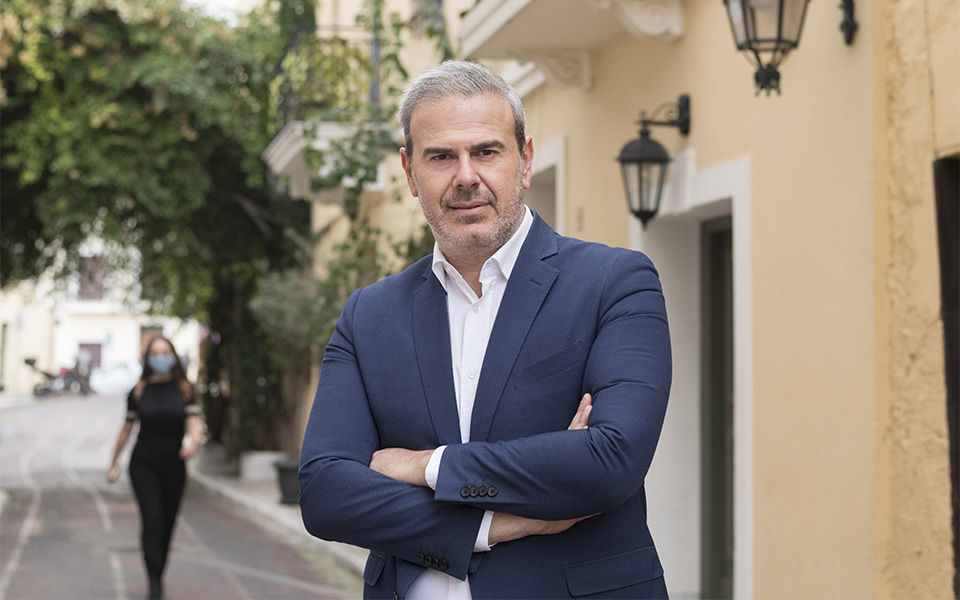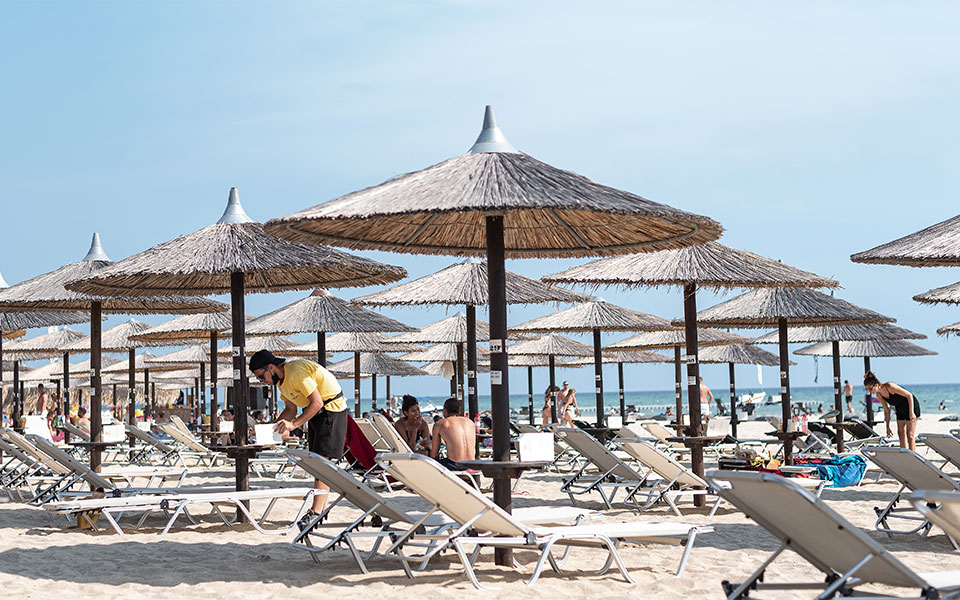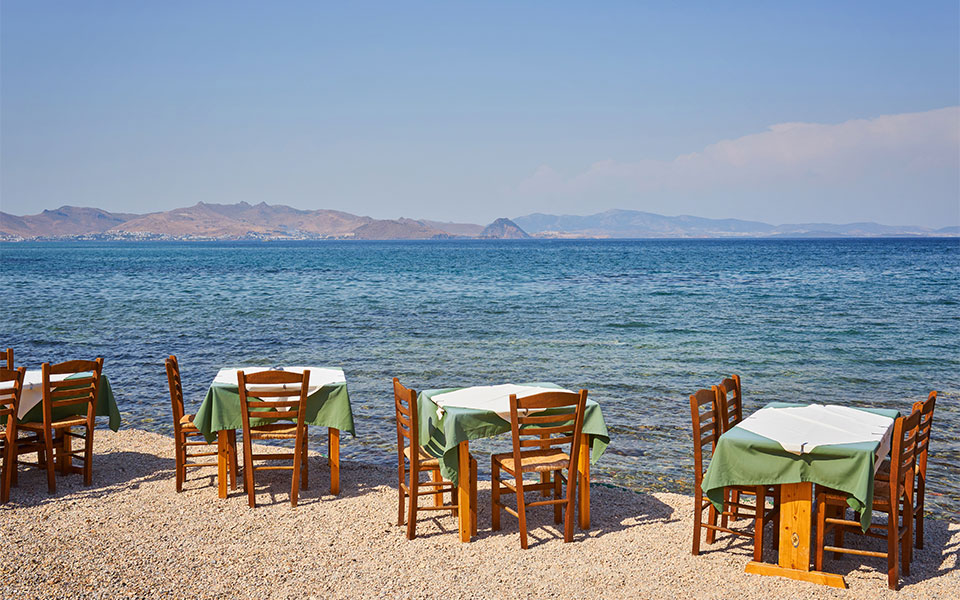Dimitris Fragakis took over the helm of the Greek National Tourism Organization (GNTO) at what was simultaneously the best and worst time for the country’s most important industry: the year when the country was shattering one tourism record after the other, while at the same time a nightmarish scenario was waiting in the wings: a once-in-a-100-year global health crisis.
Having been raised in an environment where he was surrounded by tourism-related activity (he hails from Hania in Crete) and a close collaborator of Prime Minister Kyriakos Mitsotakis since the latter’s first forays into parliamentary politics (as a scientific advisor in parliament over a number of years and as an aide during Mitsotakis’ tenure as Minister of Administrative Reform during the period 2013-2014), he has the difficult task of facilitating the national effort to restart Greek tourism, beginning with the upcoming tourism season.
We asked him everything we hope any Greek would ask who sees tourism as a source of added value for the country and who is anxious to see the return of our national industry.

© Vangelis Zavos
Mr Fragaki, will we need to be vaccinated to travel in Greece this summer?
The answer is a definitive no. One of the many lessons that we learned last year from the management of the Covid-19 crisis was the need for a common policy among at least the European countries with regard to the preconditions for the movement of travelers. European tourism as a whole, not just Greek tourism, suffered damage from the continual changes in these preconditions, depending on the country and the period.
The letter from the prime minister concerning vaccination certificates was a correct political move, in order to mobilize Europe and to introduce from now into the European discourse the issue of clear health-related preconditions for movement. Both vaccination certificates and rapid tests comprise tools that can create the possibility for travel in the summer of 2021.
This year, in any event, we have more public health “weapons” and greater experience in managing the pandemic in comparison to last year in order to facilitate safe travels. And it is our duty to make use of all of them.

© Shutterstock
During the pandemic there has been a return to the fore of perspectives proposing a “change to the productive model”, that suggest that our country is too vulnerable to crises that affect our tourism industry.
I don’t think there is an easy answer to that question. All those who raise questions of “changing the mix” should also make clear which sectors they suggest will “replace” tourism, how long it will take, and in which regions. Tourism indeed accounts for a large part of our GDP. But it is also important for a broad swathe of our society as an economic activity, as it is a central focus around which dozens of other economic activities and professions revolve.
Greek tourism has displayed an exceptional dynamism over recent decades. It did not get so big easily or opportunistically. It has been built up on solid foundations; there have been important private investments in the sector, and we have developed a high level of expertise and a good reputation in the tourism sector worldwide. That is why I believe that, despite the damage that it has incurred from Covid-19, our tourism will prove to be more resilient than a virus.
How is the GNTO organizing its strategy in light of yet another unpredictable tourism season?
At the GNTO we are not deluding ourselves. We know that we will have to operate on shifting sands this coming season, too. But we choose to treat the crisis as an opportunity. And that’s why, as a first step we have chosen for our strategy to have a three-year horizon and to function as an umbrella with regards to the promotion of Greek tourism, something that is happening for the first time.
So its not just about a simple campaign but a broader strategic plan that will take us to tomorrow, to a new narrative for Greek tourism. Adaptability and flexibility are the basic parameters of the strategy of our campaign, as truly the challenges and uncertainties are great. But we are betting a lot on progress on the vaccination front, on rapid tests, which are becoming cheaper and more accurate, as well as on health and safety protocols. All of this will reinforce the feeling of safety on the part of travelers and will reinvigorate the sector.
But we are not taking our foot off the gas. For the first time we will be implementing a dynamic model of resource management, which will rely on the continual analysis of all the data (fixed and changing) in order to have a better distribution of taxpayer funds. This is connected with a dynamic model of communication, in which we send the right message to the right recipient, at the right time and in the right way, through personalization and a unique “ecosystem” created for our communication needs. We are thus preparing for all scenarios with the most innovative tools.

© Shutterstock

© Shutterstock

© Shutterstock
In the public consciousness, Greece has become associated with mass tourism. How hard is it for us to reposition our touristic brand?
Investing in the authenticity and unique identity of Greece, the land and our people is our central strategic choice. The pandemic set us back, but it made us see even more clearly how urgent the need is for the further enrichment of our tourism product.
Covid-19 functioned as an accelerator for developments, and that’s why in the new strategy our central choice is once again the attraction of more visitors all year round, highlighting our uniqueness, those things that one can only find in Greece all together, almost anywhere. Unique experiences in every part of the country, each of which has its own story to tell the visitor.
It’s on the basis of this strategy that our campaign will also seek to position itself in the minds of prospective visitors to our country, simply and understandably, because we know what travelers want after what they’ve been through, and that is Greece.
What do you believe will play the most important role for the better management of this unprecedented situation in tourism, in order to achieve a quick recovery?
If I were to answer in a word, I would say “adaptability”. I think that the day after the pandemic will be very different in the tourism sector. We don’t yet know how different, but certainly many things will change and everyone will have to adapt to new circumstances.
Greece and the Greeks displayed admirable adaptability over the past months, which became a topic of positive commentary in the international press. It is not by chance that the Ministry of Tourism and the GNTO were voted as the leading tourism board in the world by the WTA [World Travel Awards] in 2020. The fact that we kept our tourism industry standing, thanks to the contributions and good cooperation of all of those involved in the sector, was a small miracle. It is also an endowment for the next season and the years to come.
I visited the websites of the GNTO and Visit Greece and you will agree that there is a lot of room for improvement for our online tools.
I won’t disagree with you. That is why, from the first day that I took on my duties I made it our aim to improve in this area. Today, for visitgreece.gr, a complete overhaul is underway and in March we will have a new portal that befits the position of the country on the global tourism map.
At the same time the Visit Greece app is already operational, an innovative application for mobiles which a few days ago was awarded with three awards, while over the course of the previous summer we operated the platform Greece Health First, which provides useful health-related information to visitors to our country.
We put a lot of weight on digital tools and make use, to the extent possible within the budget of the GNTO, of all the available digital platforms. Our campaigns in 2020 were over 70% digital and adapted to the modern environment. Correspondingly, we will run campaigns also on social media, something which we did successfully last year, with our campaign on Twitter, for example, picking up another important award.
I will add here the capacity that we now have to collect and analyze data and consumer trends, which we will make use of for targeted campaigns, especially now that our digital quiver must be full.
This interview was first published in Greek at kathimerini.gr.












